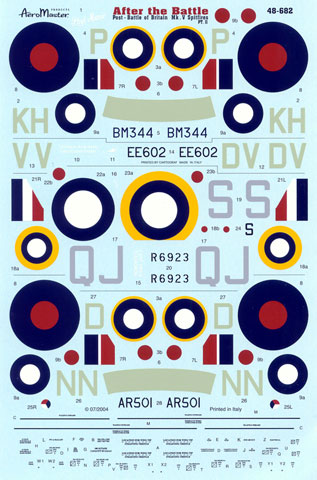48-682 from AeroMaster Products is the second sheet
in the two-part coverage of post 1940 Supermarine Spitfires Mk II and Mk
Vs. Markings are provided for a further four aircraft. The individual
aircraft and their markings are:
 Mk
Vb BM344, KH-P 'Phyl Marie' as flown by Squadron Leader Syd Ford, 403
(Canadian) Squadron from Manston in the August of 1943. The aircraft is
the RAF Temperate Scheme of dark green/ocean grey upper surfaces with
medium sea grey undersides. The provided markings are:
Mk
Vb BM344, KH-P 'Phyl Marie' as flown by Squadron Leader Syd Ford, 403
(Canadian) Squadron from Manston in the August of 1943. The aircraft is
the RAF Temperate Scheme of dark green/ocean grey upper surfaces with
medium sea grey undersides. The provided markings are:
·
Sky- KH squadron and individual
aircraft P code letters.
·
Black BM344 serial number.
·
The name 'Phyl Marie' in white.
Mk Vc, EE602, DV-V Central
Railways Uruguayan Staff. The machine belonged to 192 (Province of
Mysore) Squadron based at Ibsley in the May of 1943. This machine is
also in the RAF Temperate Scheme. The provided markings are:
·
Sky DV squadron and individual aircraft
V code letters.
·
Black EE602 serial. The placement guide
advises that this was partially over painted by the sky fuselage band so
you will have to "adjust" this decal yourself.
·
Central Railways Uruguayan Staff title
in white.
·
Some form of emblem/marking in white.
Mk
Vb R6293, QJ-S 'Sheila' flown by Flying Officer Alan Wright of 92 (East
India) Squadron from Biggin Hill in May of 1941. The odd one out, it is
in dark earth and dark green upper surfaces over sky under surfaces with
a sky spinner and rear fuselage band. The provided markings are:
·
Mid-grey QJ squadron and individual
aircraft S code letters.
·
Black R6293 serial number.
·
Individual aircraft S code letter in
black (for the under side of the nose).
·
East India Squadron title for the
fuselage in white.
·
The name "Sheila", also in white.
Mk
Vc AR501, NN-D of 310 (Czech) Squadron at Exeter in August of 1943.
Camouflage is RAF Temperate Scheme. The provided markings are:
-
Sky NN squadron and individual aircraft D code
letters
·
Black AR501 serial.
·
Small modern-day Czech national
insignia.
One
set of type A1 fuselage roundels, type B upper wing roundels; type A
under wing roundels and 27" fin flashes are provided for the third
option. The red centres of the roundels (with the exception of the type
Bs) are supplied separately in case of register problems.
Two
sets of type C1 fuselage roundels, type C under wing roundels and type B
upper wing roundels and a pair of 24" fin flashes are provided for the
other three options. A single complete set of stencil data completes
the provided markings.
The
placement guide is A-4 in size. It shows left hand side colour profiles
of, as well as plan views of the topsides and scrap views of the wing
under surfaces for three of the options. There is a further three-view
drawing that shows the stencil data placement albeit for a Mk IX.
The
decals have been printed by Cartograf.
The
placement guide advises that the recommended kit to produce a Mk II is
the Tamiya Mk I and to use the Airwaves and Aeroclub conversions to
convert them to Mk II standards. All well and good, but none of the
options are Mk IIs! The recommended kit for the Mk V options is the
Hasegawa and Tamiya ones. Be aware though that two of the options are
Mk Vc s which have different wings than that provided in the Tamiya or
Hasegawa kits. Resin conversions sets are available to help you here
but you can accomplish it with a good set of plans and a little
modelling skill. You may also want to visit the Ultracast website in
an effort to procure the different propeller blades and spinners
required.
The
decals and placement guide come packed in a clear plastic zip-loc bag.
The
same comment applies for the Part II sheet - A nice sheet from
AeroMaster that will give you an opportunity to add some similar but
different Spitfires to your shelves.
Recommended.
Home | What's
New | Features
| Gallery |
Reviews | Reference
| Forum
| Search